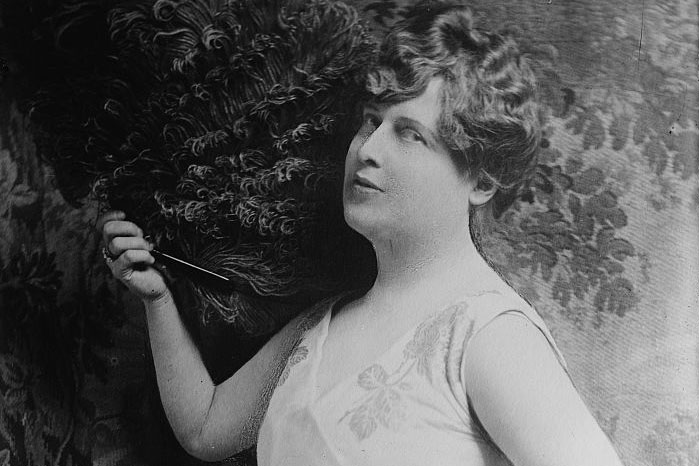A New York City socialite, heiress to a massive fortune, Florence Foster Jenkins blindly took a huge risk when she attempted to change her will—if the movie version of her story is to be believed. I’m a fan of Meryl Streep, who plays the title role; she’s a perfect mixture of beauty (those cheekbones!) and brains (degrees from Vassar and Yale).
My Amazon Prime Video account was suffering from neglect, so recently I got cozy and streamed the comedy-biography, Florence Foster Jenkins, for which Streep received an Oscar nomination.
Florence craves fame as a singer, but early in the film it becomes—well—loud and clear that her singing voice is music to nobody’s ears. Using her connections, Florence persuades the proprietors of Carnegie Hall to schedule her debut performance. She expects her pianist, Cosmé, a man small in stature but large in ambition, to accompany her. Fearing embarrassment, Cosmé demurs . . . but Florence implores . . . and Cosmé relents.
Backstage, before the show begins, Florence pulls her will from her briefcase and announces that she wants to change the will in order to leave Cosmé “a little something” when she dies. She scrawls a few words, signs her name, and then asks her friend, Phineas Stark, to witness her signature. Cosmé and her indifferent romantic partner, St. Clair Bayfield (played by Hugh Grant), observe.
That seemingly innocuous scene interrupted my enjoyment of the movie, because it was an estate planning disaster. The execution of wills is a delicate matter. Any mistake can invalidate a will. In Florence’s case, I spotted multiple mistakes.
Florence’s Will Would Not Have Held Up In Massachusetts or New Hampshire
What did Florence do wrong? Plenty, if she lived in Massachusetts or New Hampshire. The New Hampshire statute is especially strict. A New Hampshire testator must (a) sign the will (b) in the presence of (c) at least two (d) qualified witnesses, who then must (e) attest in writing to the testator’s signature (f) while in her presence.
Note that certain individuals are disqualified from serving as witnesses. Under New Hampshire laws, any person who is a potential beneficiary, and that person’s spouse, are disqualified. By sheer luck, Florence avoided this pitfall.
She made another serious misstep, however. Only one person (Phineas) signed as a witness. And she violated the general rule that no beneficiary of the will should be present in the room with the testator during the signing. Cosmé’s presence, for example, invited a future will contest. A will contestant could claim plausibly that Florence’s gift to Cosmé resulted from his threatening her by refusing to perform with her at Carnegie Hall, given that the Carnegie show was hugely important to Florence and that Cosmé had the power to spoil it.
Massachusetts Sets a Slightly Lower Bar
Massachusetts law is slightly more lenient than New Hampshire’s. In the Commonwealth, the testator need not sign a will in the presence of both witnesses. Each witness may attest to either (a) the testator’s acknowledgment of his or her signature or (b) the testator’s acknowledgment of the will itself.
Massachusetts, like New Hampshire, requires two additional, disinterested witnesses to be present if the witness to the signing is a beneficiary, or the spouse of a beneficiary, under the will. Massachusetts law provides, however, that in the absence of those additional witnesses, the gift will not fail as long as the “the interested witness establishes that the bequest was not inserted, and the will was not signed, as a result of fraud or undue influence by the witness.”
One thing is certain—there isn’t much room for creativity in executing wills. Estate planning attorneys may not be able to hit the “high note” that Florence Foster Jenkins craved, but by carefully following the appropriate statutes, they can protect their clients.

